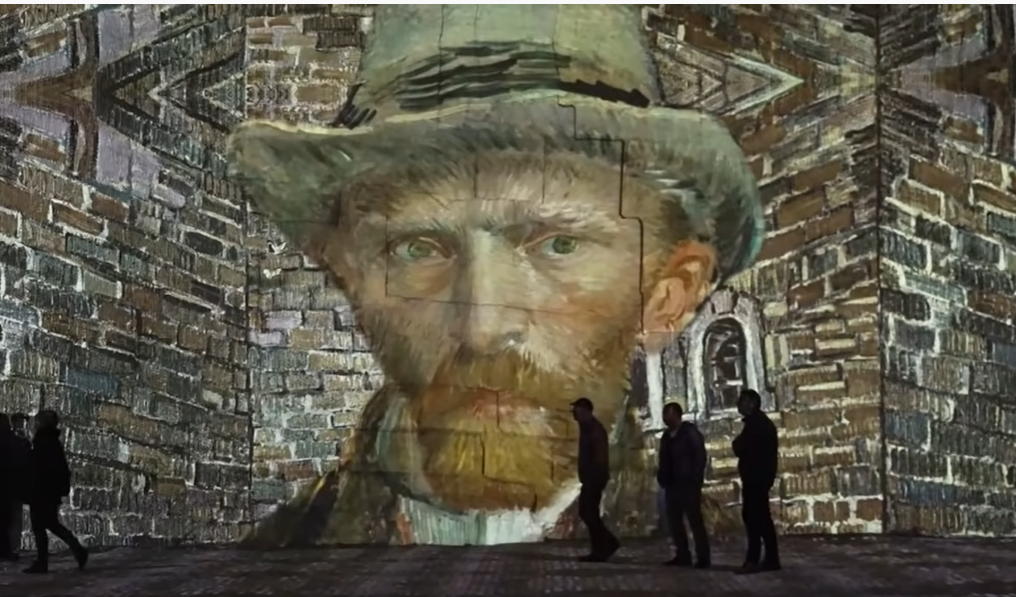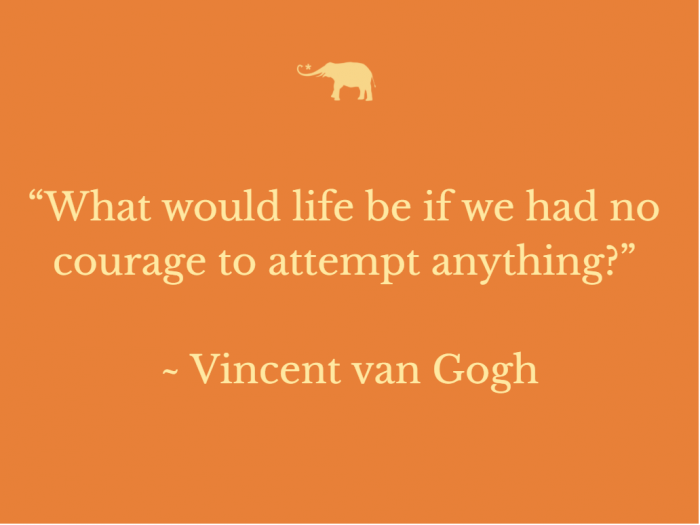
As I handed over my vaccination card to the masked security guard, I couldn’t help but think:
What am I doing here?
I don’t even like Van Gogh. Maybe it’s leftover queasiness around the ear maiming, or that everyone else liked him, but I never took to his paintings.
But the Immersive Van Gogh Experience changed all that.
Walking through the expansive sunflower-covered entrance, a huge Van Gogh head appeared. This video depiction had an intact ear, but the shadows across it kept changing. Darkening. A perfect introduction to the larger immersive experience, which culminated in a sold-out concert hall filled with children, adults, and seniors sitting in twos and threes on soft carpets, sling-back beach chairs, and large square pillows.
Surrounding the crowd were orchestrated side-by-side videos telling (and retelling) Van Gogh’s story. Each piece imaginatively transitioned to the next with steam from a train, or gushing water or cherry blossoms. This multi-sensory experience whisked us from his beginnings as an artist, to his influence by Japanese paintings, to the events leading up to his eventual death by suicide.
One fascinating passage compared Starry Night Over the Rhone and The Starry Night. Similar paintings, but the former depicted the city beneath the stars as expansive and filled with light. The latter, painted in an asylum shortly before Van Gogh’s death, depicted the city as shadowy and insignificant.
Sitting in the packed space, it was both sad and unbelievable that Van Gogh sold few paintings while alive—and died at 37 believing he was an artistic failure. Today, his paintings are among the most valuable in the world and have sold at prices ranging from $50 million to $82 million each.
Van Gogh is not the only creative unappreciated while alive. Claude Monet’s paintings were declared “formless, unfinished, and ugly.” Paul Cezanne and Georges-Pierre Seurat were only given respect after their deaths. Writers too were similarly unacknowledged. Emily Dickinson was told her poems were “quite as remarkable for defects as for beauties.” And Herman Melville’s Moby Dick was critically berated and unprofitable.
And Van Gogh not only suffered from obscurity, but mental and physical difficulties too. In response sometimes he painted—his pain reflected in brilliant colors and bold brush strokes. Other times he drank. Or hurt himself. Sitting there viewing the exhibit I couldn’t help but feel a kinship with him. Even the ear incident became relatable.
Who hasn’t committed some self-sabotage in response to stress?
Sure, we don’t cut off body parts, but what about that “reply to all email” skewering a colleague? Or the social media post that alienates half of our friends and the voting public? Or those drunken and angry outbursts that ruin a loved one’s special day?
We have a choice in how we react to life. Philosopher, author, and Holocaust survivor, Victor Frankl famously said, “Between stimulus and response there is a space. In that space is our power to choose our response. In our response lies our growth and our freedom.”
We can lean into the light. Share our gifts. And not attach to the outcome or feedback we experience while on the earth.
Because our existence as beings is both finite and infinite, we have no comprehension of the long-term impact of our creative expression, mentoring advice, or energetic influence. But if we do our best, and act with good intent—it doesn’t matter.
Who knows, maybe our effort will inspire a popular multi-city art installation that gives a depressed and lonely populace a much-needed escape. Or encourage a young colleague to pursue more education or their next career milestone. Or motivate one fearful writer to finally let go—and publish her first book.
No matter the form, our gifts are needed by the universe. And as Stephen Cope says in his book The Great Work of Your Life, “Let go of any clinging to how this all comes out. You cannot measure your actions at this point by the conventional wisdom about success and failure.”
Or as Vincent van Gogh aptly said, “What would life be if we had no courage to attempt anything?”
Have you seen the Immersive Van Gogh experience? If so, please share your impressions. If not, what artists have inspired you to leaps of faith and creativity? Looking forward to reading about your experiences in the comment section.
May they be of benefit.
~
~


 Share on bsky
Share on bsky





Read 40 comments and reply